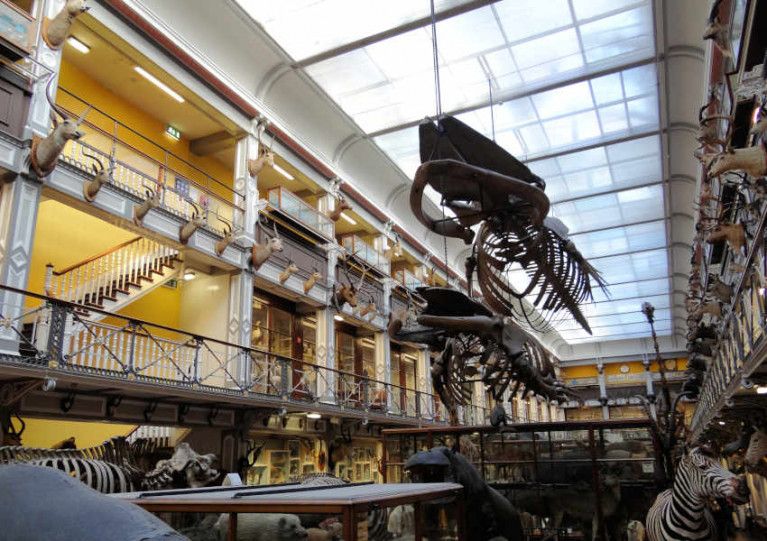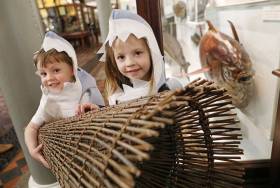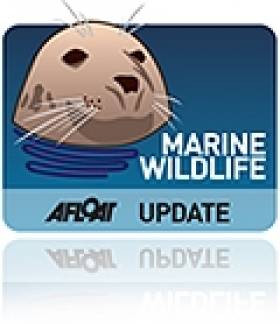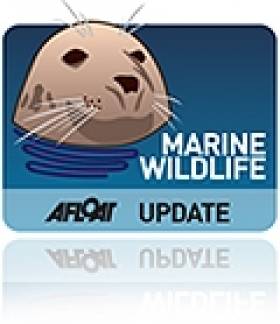Displaying items by tag: Natural History Museum
The giant whale skeletons of Dublin’s ‘Dead Zoo’ are being dismantled as part of a €15 million project to upgrade the building, as RTÉ News reports.
The remains of a fin whale recovered from Bantry Bay and a juvenile humpback stranded at Enniscrone both date from the Victorian era and have been suspended from the ceiling of the natural history museum for over 100 years.
But from next month the marine wildllife specimens will be removed piece by piece to allow for work on the building’s roof — while other exhibits are also being relocated amid work to improve accessibility.
"We are definitely facing a unique challenge,” said Nigel Monaghan of the National Museum of Ireland - Natural History, who added: “Only a handful of people have done this in other parts of Europe over the past decade.”
RTÉ News has more on the story HERE.
Fishy Fun At The Natural History Museum This July
Ireland’s fisheries resource is set to come alive at the Natural History Museum this summer at a free event called Fishy Fun.
A range of interactive activities suitable for all the family will be part of the special one-day event on Saturday 20 July, one of a number of initiatives this summer to recognise International Year of the Salmon.
Visitors to the ‘Dead Zoo’ on the day will learn about the fantastic collection of fish on display and how the salmon, Ireland’s most iconic fish species, is facing its biggest challenge yet.
Fisheries staff will be on hand to help youngsters examine the creepy crawlies which live in Ireland’s rivers and lakes via microscopes. while novice anglers can try their hand at fishing through a virtual fishing simulator.
As well as the museum collection, aquariums will also showcase some of the freshwater fish which live in waters across Ireland.
“We are looking forward to introducing the public to the mystical aquatic world at this family-focused event,” said Inland Fisheries Ireland chief Dr Ciaran Byrne.
“Novice anglers, future fisheries biologists or scientists or anyone who has an interest in the natural world will enjoy learning more about the fish and creatures which live in our waters and what we can do to ensure their ongoing conservation for future generations.”
The free Fishy Fun event will take place from 10am-4pm on Saturday 20 July in the National Museum of Ireland – Natural History, Merrion Street, Dublin 2.
As part of the event, children and schools are also invited to enter a national colouring competition, The Salmon of Colour, which will be available in the museum and online in the summer months with more information coming soon.
Mystery of Missing 'Narwhal' in Clare is Solved
#MARINE WILDLIFE - The mystery disappearance of an allegedly rare whale carcass from a Co Clare beach last week has been solved.
As The Irish Times reports, Clare County Council admitted yesterday that the "badly decomposed whale" was removed from Liscannor beach "due to public health concerns".
The vanishing of the creature had been a source of puzzlement to the Irish Whale and Dolphin Group (IWDG), after scientists dispatched to examine the carcass found no trace on arrival.
Experts had been hoping to verify whether the carcass was indeed that of a narwhal, an Arctic cetacean renowned for its unicorn-like tusk.It would have been the first recorded sighting of a narwhal in Irish waters.
Max Halliday from Shannon, who reported the find to the IWDG, said he was "convinced that what I saw is a narwhal. It had the long tusk protruding from its head, but its head was badly damaged. I am absolutely mad that I didn't take a photo."
According to the Irish Independent, the IWDG had appealed to those responsible for removing the whale to get in touch so the remains could be transferred to the Natural History Museum.
But it has since emerged that the creature was taken to a rendering plant in Derry by a team contracted by the council.
A spokesperson for Clare County Council said no remains of a tusk were found in the removal operation.
North Atlantic Killer Whales Feeding on Sunfish Says IWDG
#MARINE WILDLIFE - The Irish Whale and Dolphin Group (IWDG) has recorded another first for the North Atlantic, with evidence showing that killer whales are feeding on ocean sunfish.
Mark Holmes of the Natural History Museum confirmed the presence of parasites unique to the sunfish found within the carcass of a female orca stranded in Doohooma in Co Mayo.
"These parasites did not originate from the whale's stomach, but came from the prey which it had eaten," said the IWDG's Conor Ryan.
"This was confirmed when the partially digested bones in the stomachs were eventually identified as those of a sunfish beak."
The discovery may explain a recent study of UK waters which found sunfish taking unusually deep dives, possibly to avoid cetaceans and other large predators.
































































